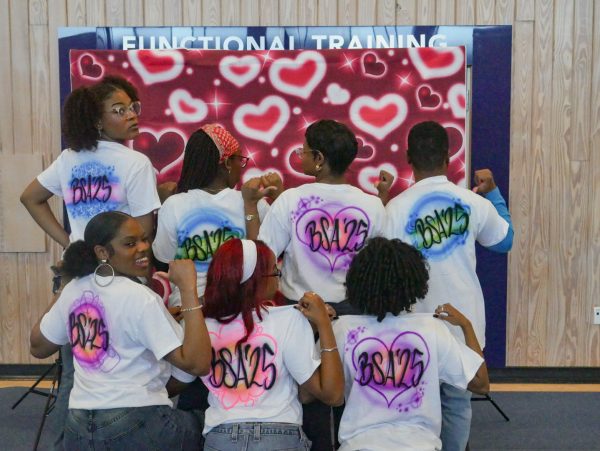Monolingual-ish: Catalonia, Trump and the Nationalist’s need for a central identity
Editor’s note: the author is a senior currently studying in Madrid, Spain. This piece is part of a bi-weekly column about her experience abroad. What follows is a reflection she wrote the weekend of the much anticipated referendum in Catalonia, Spain which was planned for Oct. 1. The referendum, which the Spanish state deemed illegal, ultimately resulted in police intervention and more than 870 injuries. According to the Guardian, preliminary results of the referendum show that 90% of Catalans voted for independence from Spain.
MADRID–On Friday night, conversation in my neighborhood is animated. As usual, it is punctuated by slags of beer and cigarette smoke. As usual, it is peppered with contention over the next Real Madrid match.
But not everyone has their head at the Santiago Bernabeu stadium yet, where the city will gather for weekly mass. Over more beer, some people shout and some people shrug about Catalonia’s impending referendum scheduled for Sunday, Oct. 1.
In Madrid, a city that seems more interested in its metaphorical naval (the stadium, that is) than politics, the referendum isn’t nothing. Catalonia’s break from Spain would mean crisis, chaos, and paradoxically, triumph for a region that saw the worst of Franco-era oppression and violence.
For Spain, a departure of one of its wealthier regions would be a logistical mess at best. For Catalonia it would mean a restructuring of the economy, panic, inherited debt and almost certainly bloodshed.
These prospects, however, are not on the minds of the independistas; mainly young, strongly regionalist defenders of Catalonia’s movement to secede.
To a generation raised on a formula of hyper-regionalism, a protective response to Franco’s fatal crusades against resistance to his regime in the northern areas of Spain, the economic repercussions of the split are merely secondary concerns; sacrifices that nearly half the population of Catalonia is willing to make to preserve its identity.
Under Franco’s dictatorship, thousands of Catalans were killed, and Catalan, the region’s official language, was prohibited from being spoken. After the dictatorship fell in 1975, a movement to preserve the region’s language and culture in a badly wounded post-war Catalonia was pursued with fervor.
Now classes in the region are taught almost exclusively in Catalan and young generations of Catalans are extremely proud of their heritage that has little to do with Spain. They see their community as a world apart from the rest of the peninsula.
Similarly, in the U.S., there are strong nationalistic feelings at play, but it isn’t a game involving referendums or secession threats.
Trump’s recent anti-NAFTA proclamations, and his dismissal of the DACA program are just a few of his more virulent displays of anti-immigrant sentiment; topping off a nearly impeccable streak of questionable policy moves.
His failure to adequately aid hurricane victims or to visit them in Puerto Rico is further evidence of his willingness to completely ignore entire sectors of the U.S. if they don’t serve his agenda.
His refusal to maintain civil relations with Mexico and indifference on his own home-front are indicators that his “America first” campaign hasn’t wavered.
Trump’s consistent, deafening message to the immigrant community has been: “we don’t need you or your language.” His obsession with maintaining a centralized national identity and his insistence on America first is similar to the narrative that has developed in Catalonia, and it eerily mirrors the story (albeit less extremely) of the beginnings of a censored Spain under the auspices of Franco. The president’s moves are focused efforts to subdue perceived threats to American hegemony and are based on insecurity.
The U.S. is the second largest Spanish speaking country in the world by population just behind Mexico. According to the Cervantes Institute, it is projected to be the first by 2050 with more than 138 million Spanish speakers. The Hispanic community in the U.S., according to the Pew Research Center, made up more than 10 percent of the electorate in 2016 and that number will increase by the next election cycle.
Given these numbers the prospects of a bilingual America, where two languages could coexist and be respected and validated, seem viable.
However, Trump’s interest is not in allowing a powerful group of citizens with a distinct heritage and language to sway the direction of the country. To him, the immigrant community and their posterity poses a plausible threat to the U.S. identity, and the only tactics he has employed to quell this fear have been attempts to smother its voice into submission.
But as we are seeing now in Catalonia, it’s difficult to war against a centuries-old identity, culture and language.
Franco knew this, and it reflected in his attempt to eradicate Catalan during the Spanish Civil war; a move that was meant to silence the people and solidify his own power. What Franco needed for his regime to survive was silence and an absence of outside influence.
Perhaps our president realizes the same. In Trump’s monolingual-ish America, perhaps it’s time we open a more frank dialogue about what it means to open our doors to other cultures, and what it means when we slam them shut out of fear. That is, if we can manage to speak each other’s language.






